-
WHITE SUN/SETO SURYA (Depak Rauniyar 2016)
DEEPAK RAUNIYAR: WHITE SUN/SETO SURYA (2016)
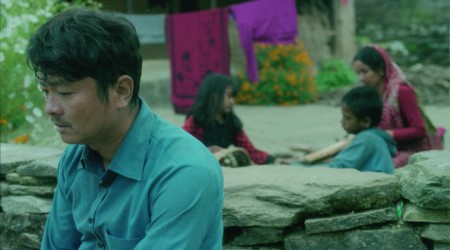
DAYAHANG RAI IN WHITE SUN
The personal and the public
It's not so often that you see a movie set in Nepal, and the Nepalese director Eeepak Rauniyar and his cowriter David Barker have created an involving, palpably real tale that skillfully interweaves the country's turbulent recent warfare with intimate, local, personal events. Chandra (Dayahang Rai) comes back to his remote village for the first time in years on the death of his father. He has been fighting in the Maoist army that defeated Royalist government forces in the 1996-2006 conflict, with 16,000 lives lost along the way. Chandra carries the wounds of this war.
Things get complicated, and Chandra has to deal with both his past and traditional customs to which the generations have different degrees of loyalty. To begin with a homeless war-orphaned kid among the boys jostling to carry Chandra's bags up the hills, Badri (Amrit Pariyar), attaches himself to him and claims to others to be his son. (Maybe he is.) He remains a touching presence throughout; we worry what will happen to him. Durga (Asha Margranti), Chandra's ex-wife, is a fiercely independent lower-caste woman who is cursed by the elders for touching the corpse. Durga has problems of her own. She has a daughter, Pooja (Sumi Malla), not Chandra's, but she wants Chandra to sign paternity papers so the girl can be legal and attend school.
The large body of the father, a village elder and a staunch royalist, has to be removed from an upstairs window because it's against custom to take it out the front door. Only males can attend the funeral. The only men qualified to carry the body down to the river are his sons, Chandra and his royalst brother, Suraj (Rabindra Singh Baniya), but they have a fight and Suraj goes off, leading Chandra on a meandering trail to find somebody else, while the village elders cluster around the corpse, stuck there for hours. No one can touch it unless the old priest (Deepak Chhetri), an absolute stickler for traditions, allows it.
Pooja and Badri, who at first are at odds, join forces and begin taking steps on their own. The arrival in the area of Chandra's former commander, with Maoist troops at hand, will also alter the course of things. All this is symbolic, of course, but it seems emotional and circumstantial because it all happens in such a relaxed, natural way, with - to the outside eye, at least - such authentic locations and performances, that we can't help getting emotionally involved. The 10-year-old newcomer Amrit Pariya, as Badri, is particularly convincing. Dayahang Rai, a locally well-known actor, inhabits his role profoundly, and exudes an inner sadness that is expressive of the country's long turbulence and troubles. This is an outstanding example of vernacular naturalism. It's exotic, for sure, but Depak Rauniyar has achieved some of the intimacy of Satyajit Ray.
White Sun/Seto Surya, 89 mins., debuted Sept. 2016 at Venice in the Horizons section; seven other festivals so far, including MoMA-FSLC's 2017 New Directors/New Films series, as part of which it was screened for this review.
A KimStim release. It's now been announced that it begins limited theatrical release 6 Sept. 2017 at MoMA (NYC) and 29 Sep t. at Laemmle Music Hall (LA).
Last edited by Chris Knipp; 08-28-2017 at 07:29 PM.
-
THE CHALLENGE (Yuri Ancarani 2016)
YURI ANCARANI: THE CHALLENGE (2016
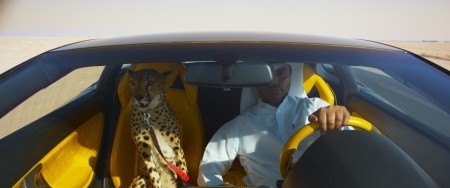
التحدي
At play and at play
Italian documentary filmmaker Yuri Ancarani's film The Challenge is a matter of access. He had it, but he also keeps his distance. He shot wealthy Qatari men at play - serious play, that costs serious money. It is a rare and special scene, but Ancarani isn't seeking to tell you all about it; it's simply material he works with visually. His interest is in ritual, and repeated gestures, and odd customs, and surreal situations.
The main focus is their pursuit, now utterly altered by the introduction of modern gadgetry such as lightweight cameras and SUVs, of the ancient Arabian gentleman's sport of falconry. We also see a man driving a Lamborghini with a leopard in the passenger seat; and we see a group riding gold Harley Davidson bikes, dressed for once not in white thawbs and kufiyas but jeans and biker jackets. The falconers buy their special birds for up to 87,000 riyals ($24,000) via an auction they view on flatscreen TV as they bid by smart phone. We fly inside a posh private plane fitted with not passenger seats but rows of perches for flacons. We see men share a tasty meal of meat, rice, and side dishes in the traditional way, with the right hand only, the fingers molding the rice into a ball.
There are closeups of men's faces, young, dark, handsome, ancestrally Arabian, with perfectly trimmed short beard. Do they trim it themselves or, more likely, have a barber come in every morning? But for all this intimacy, there is no sense of entering the personal lives of these men. Ancarani's film is more like an art piece, shifting from scene to scene in a distancing way, occasionally bringing in soaring music, often offering nothing but ambient sound or the childish, repetitious dialogue of the 'sportsman' or buyers, saying nothing but 'that's a good one,' 'it's worth the price,' or most often the phrase 'ma shaa' Allah', which in this context is just a muslim way of saying 'wow!'
Mike D'Angelo wrote in Letterbox'd: "My kind of documentary: utterly devoid of exposition (or even basic contextualization), formally adventurous, offhandedly witty (love the sharp cut to a tranquil landscape shot that happens mid-car accident, just as a dude witnessing the vehicle roll over clutches his hands to his head in shock), confident enough to let viewers intuit the film's meaning/intention/big idea."
It is a confidently accomplished film and an elegant one. It's also an alarming one that makes its very rich subjects look like morons. But they look good too. Their cars and their hooded birds and they are handsome, and surreal. Jonathan Romney of Film Comment wrote: "the film is so elegantly shot, with heightened attention to staging and symmetry, that at first thought I was watching a gallery-art fabulation à la Matthew Barney. But no. . ." Material to play with, too good to be true. And in a sense itself making this film is as idle a kind of play as the "shaykhs'" with their dangerous SUV races, their falcons, and their Lamborghinis. And the photographs from the camera attached to a bird of prey on the hunt for a pigeon: the cinema of the future!
The Challenge, 69 mins., debuted at Locarno where it won the Special Jury Prize and was nominated for the Golden Leopard. Ten other international festivals, including the FSLC-MoMA New Directors/New Films (NYC), as part of which it was screened for this review.
Last edited by Chris Knipp; 04-03-2017 at 12:38 PM.
-
THE SUMMER IS GONE/BA JUE (Zhang Dalei 2016)
ZHANG DALEI: THE SUMMER IS GONE/BA YUE (2016)
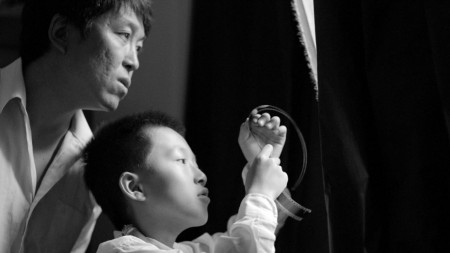
ZHANG CHEN, KONG WEIYI IN THE SUMMER IS GONE
About a boy
The style of Zhang Dalei's excellent debut feature links it both to Edward Yang and Jia Zhang-ke: it's a nostalgic, restrained study - far from gaudy coming-of-ageers, of a boy of twelve in the Nineties in the director's hometown in Inner Mongolia, Hohhot, a place and time so quiet it feels sometimes like the Fifties (but trouble is on the way). Unlike Yang's and Jia's early panoramas, here the focus is more modest: a summer before the boy starts middle school. His rather nervous and fussy mother (Guo Yanyuan) is a teacher and wants him to get into an elite school, requiring a good test score, or maybe a bribe as in Mungiu's recent Graduation (NYFF 2016). His father (Zhang Chen) doesn't see the point. His own very real concern, shared with a close group of coworkers who gather socially to drink beer and talk, is that he'll lose his state-run filmmaking job - and his career dreams - in the growing wave or privatization. The film matches public and private: a big transition for the Chinese economy comes with the boy's big jump from elementary school to junior high.
Zhang Xiaolei (Kong Weiyi) is a scrawny kid with matchstick limbs. He always, always has his nunchucks around his neck, and a Bruce Lee poster is his inspiration, but despite a moment of showing off with them in his bedroom, this is a bit of a joke. He is a scrawny kid with matchstick limbs. He is a pensive, but cocky boy.
Xiaolei, as embodied with charm and serenity by Kong Weiyi is a quite ordinary, nondescript boy, but that makes him see more real. He is without discernible ambition, though he goes along - for a while - with his mother's push for him to try to get into an elite school. He is close to his father, physically, even though his dad sometimes loses patience with him. They regularly go to a local - vanishingly - state run cinema where they can in free and watch classic Chinese movies. As Clarence Tsui points out in his Variety review, when the free entry ends is when Xiaolei and his dad try to get into "The Fugitive, the first-ever US film to receive an official release in China back in 1994" - another milestone of the several ones Zhang's meditative screenplay alludes to.
Zhang works quietly (like Yang) but with a full social canvas, using amateur actors throughout, with marvelous social scenes at a restaurant, pool hall, swimming pool, and of tough kids on the street - and a particular tough kid called Saner, a misfit Xiolei admires and, unwelcomely, attaches himself to. The camerawork by Lv Songye quietly soars too. Watch the scene when Xiaolei comes out into a rainstorm at night and watches cops handling some of those toughs: the long corridor of street with bright light at the end silhouetting the action a block away is gorgeous, but because it's black and white it doesn't seem too showy. The only color is at the end when Xiaolei's father has gone away to work on a film, because there's now work for him at home anymore. We have seen his father grouse and worry, and watch foreign videotapes at home.
A moment symbolizing dad's giving up artistic and job hopes comes when he grabs his grainy tape of Scorsese's Taxi Driver - he's been watching the famous "Are you talking to me?" scene over and over - and pulls out the tape in anger. At the end of the summer - which wasn't as peaceful and happy as Xiaolei or his father would have wanted - father boards a bus and rides away to seek work on photo shoots elsewhere. He eventually sends a videotape showing the shoot and him. The grainy video is in color. And that's the end.
Perhaps Tsui is correct: the reality and the changes going on at the time of the film are "certainly much more harsh than the sepia-tinged stories unfolding here." But this is a lovely restrained and slow-building study in childhood and change. here is an awful lot here, and it all fits together subtly and seamlessly.
The Summer Is Gone/Ba yue/八月 (August), 106 mins., debuted 23 July 2016 at the FIRST International Film Festival Xining, also showing at Tokyo, Taipei, Rotterdam, Groningen, and New Directors/New Films, screened at the latter for this review under the auspices of the Film Society of Lincoln Center and the Museum of Modern Art, New York.
Showtimes:
March 16, 9 pm, Walter Reade Theater FSLC
March 17 6:45 pm, Titus Theater MoMA
Last edited by Chris Knipp; 03-01-2017 at 04:56 AM.
-
WÙLU (Dauda Coulibaly 2016)
DAOUDA COULIBALY: WÙLU (2106)
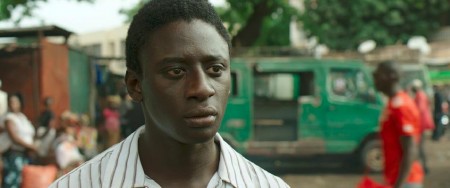
IBRAHIM KOMA IN WÙLU
A dangerous success
Wùlu, Ladji, a young Malian who's continually on the screen, switches from bus driving to drug trafficking and earns himself and his sister a lot of money. They rise to the top of Bamako society and Ladji gets into more and more danger - right to the edge of doom. A posT-film title explains that the cocaine boom in Mali brought vast sums into the country, and that was a large factor in the political crisis of the past five years. So, a thriller that is topical and political, confident and brightly colored and full of energy from first to last. This is an unusually accomplished and great-looking first film from Africa whose mise-en-scène, from hovels to mansions, town squares to desert shootouts, is impeccable.
As Ladji, Ibrahim Koma (who was actually born in Paris) is impressive, confident too, a dark, burnished statue who rarely shows fear or uncertainty. He is continually on the screen and we are asked to care about him, but so great is his impassivity and remoteness it may be a bit hard to care about him. We understand his logic and his motives. He's driven cross-country busses for five years and we see him at first explaining to a novice who to let on board. No fatties: they take up too much space. No sexy women: too distracting. No old people: too slow. He's got it aced, but when a nephew of the boss takes over his driving job and, absent the expected promotion he angrily walks off the job and to Driss, a drug dealer who owed him a favor and presto! he's transporting pot the Senegal on busses and bringing back cocaine. He innovates, suggesting small passenger vans, which customs passes because they'r too much trouble to check. Except there's a dangerous contretemps the very first run, and when he gets back, Driss is murdered.
From then on it's success following success and as the ante increases, just like Scarface, the hero flies closer to the sun. Ladji and his two pals and cohorts Houphouet (Jean-Marie Traoré) and Zol (Ismaël N’Diaye) start working for Driss's boss, Jean-François (Olivier Rabourdin). So much money is coming in, they're sent further afield, to Timbuktu, with weapons. And they need them.
Intermixed with the intense, accelerating narrative of the drug trafficking, which gets more dangerous and more profitable all the time, is the story of himself and his sister Aminata, a prostitute when we meet her, later a professional party girl (played by Malian singer Inna Modja). Ladji has so much money he buys land and builds a big house with a large pool. He's not happy - the danger of his criminal operations is matched by financial risks, and realization that his liaison with the high class Assitan (Mariame N’Diaye), which Aminata first pointed him to, is shaky, because he not respectable - and the high living has put him in heavy debt, which hits the fan when political disintegration in a neighboring country forces his French drug boss to check out and banish him. Again he goes higher, to Assitan's father, for more risk and more profit. Again Coulibaly has surprises in store for us.
Wùlu is well-written and skillfully plotted. It has constant excitement. Its scenes or social excess are as colorful as those of crime. It merely suffers from that familiar problem of actioners. It never stops for breath. The non-stop intensity holds our attention. But it also makes every moment equally tense, thus reducing some of the force of climactic moments - and leaving little room to set mood or develop character. There is nothing wrong with making Ladji a kind of Camus Stranger, an empty man, although this story hasn't the style of a movie by Jean-Pierre Melville or the philosophical underpinnings of Camus. But it's damn good stuff for an African debut film, it looks great, and its cast is excellent.
Wùlu, 95 mins. (in Bambara and French), debuted at Angoulême Aug. 2016; in at least nine other international festivals including Toronto, Hamburg, London, Gothenburg and the Film Society of Lincoln Center-Museum of Modern Art New Directors/New Films festival, as part of which it was screened for this review. See the highly favorable reviews from Toronto by Pamela Pianezza in Variety and Boyd van Hoeij in Hollywood Reporter.
New Directors showtimes:
Saturday, March 18 1:30 pm MoMA
Sunday, March 19 6:45 pm Walter Reade Theater FSLC
Last edited by Chris Knipp; 03-01-2017 at 05:00 AM.
-
ARÁBIA (João Dumans, Affonso Uchoa 2017)
JOÃO DUMANS, AFFONSO UCOA: ARÁBIA (2017)
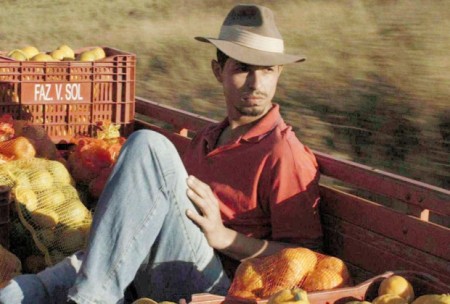
ARISTIDES DE SOUSA IN ARÁBIA
The wanderer
Arábia is storytelling. It's about a wanderer, who worked at all kinds of laborer jobs imaginable in Brazil. So it's also about labor, pretty explicitly. Neil Young in Hollywood Reporter called it a "political road movie." But it's not so much a tract (or a "road movie") as a meditation about loneliness and rootlessness, while at the same time full of manly togetherness and music - a lot of music, which helps mitigate the sadness. This is a unique thinking man's film, rather like a novel - though its interest isn't so much in the content as in the meditative structure and the moody atmosphere. For some reason - the philosophical voiceover, partly - it reminded me of Wong Kar Wai's Happy Together.
Arábia takes its time getting started, in the manner of old-fashioned adventure tales. It's a full 20 minutes before the title even appears. First there isa long shot (arguably longer than necessary), of a youth, Andre (Murilo Caliari), riding a bike, then a song, and up to the title it looks like this movie is going to be about Andre. Then news that a man named Cristiano (Aristides de Sousa), who lived nearby in this industrial neighborhood in Ouro Preto, Brazil in the southern state of Minas Gerais, near an old aluminum factory, where he, Cristiano, worked, has been in an accident and is in the hospital. Andre is sent to Cristiano's flat to get clothes for him and his ID. When there, Andre comes across a notebook with a journal in it. Writing about "important events in his life" turns out to have been a project of a factory theater group, which Cristiano joined to be more among people. Well, Andre begins to read the journal. . .
And what follows in the rest of Arábia is a narrative - the journal - in De Sousa's voice of Cristiano's many wanderings, in his voice over the past decade, all over the country working at all kinds of jobs, a one-man tour of the world of physical labor. We see him as the story unfolds in many diverse scenes. The filmmakers make no secret of their focus on the subject of manual labor. One memorable scene has Cristiano discussing with a companion of the time - people come and go in his life, including his one true love Ana (Renata Cabral)- a an older man who is shortly to die of diabetes - what contents are best and worst to load onto a truck: cement, tile, potatoes, etc. And at the final factory he starts working the night shift and explains why it's bad.
But Aristedes deSousa, with his strong, rough voice and lean features, is never a metaphor, always real, and so are the situations and settings. This is also a story of hard knocks. Cristiano does jail time, and another thing happens that could have led to jail. The story with Ana is suffused with sadness. And loss of best friends, when circumstances force a sudden departure. And constant change of venue every few months or year or so. There is a sense of sampling, of exploration, and one may think of Orwell's Down and Out in Paris and London.
It is the combination of its contemplation and filtering of experience along with, through images, the retaining of the experience in very specific and vivid form that gives this film its special quality. Through the film we live life and examine it at the same time, and this is what is novelistic and not like most films.
Arábia, 97 mins, debuted at Rotterdam 1 Feb. 2017. It was screened for this review as part of New Directors/New Films (Film Society of Lincoln Center, MoMA).
Showtimes:
SATURDAY, MARCH 18 4 p.m. Walter Reade Theater FSLC
SUNDAY, MARCH 19 6:30 p.m. MoMA
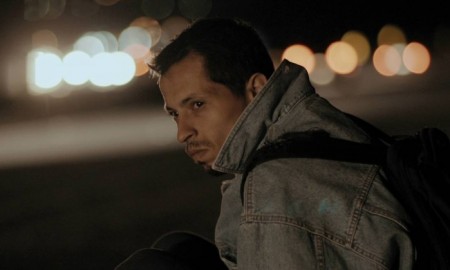
ARISTIDES DE SOUSA IN ARÁBIA
Last edited by Chris Knipp; 03-01-2017 at 06:20 PM.
-
BY THE TIME IT GTS DARK/DAO KHANONG (Anocha Suwichakornpong 2016)
ANOCHA SUWICHAKORNPONG: BY HE TIME IT GETS DARK/DAO KHANONG (2016)
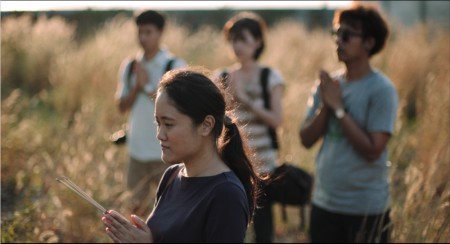
A cinematic experiment of great elegance, all in the head
Anocha Suwichakornpong is a made-to-order film festival darling. Her films are exquisite, hushed, and conceptually complex. Their visual debt to her more famous countryman "Joe" Apichatpong Weerasethakul is obvious. The point of departure of By the Time It Gets Dark, is a film, or film within a film, related to the 1976 massacre of Thai student dissidents at a university. The settings are beautiful - perhaps too beautiful: this seems like a brochure for a decoration magazine. The people are too beautiful too, including the young men whose regular features - and, at one point, smooth naked thighs - are lovingly dwelt upon. When anything serious happens, like the death of a leading cast member in a car accident, it goes by with such a tiny scintilla of emotion that you don't wonder that the massacre doesn't build up much heat either.
A brace of art-film critics, excerpted by Critics Roundup, have penned enthusiastic comments on the film. Jay Kuehner (from Toronto, Sept. 2016), for instance: "To call what happens in By the Time It Gets Dark a 'plot' is to do it a disservice of sorts, such is the beguilingly self-reflexive nature of Anocha Suwichakornpong’s becalmed, trippy, historically conscious fungus of a film." Which is to say it vanishes up its own arse, seduced by its own cleverness and elegance. Perhaps it is "deeply felt," as a festival blurb claims. Certainly a massacre, with thousands injured and at least 50 to 100 killed by royalists and right wing troops, is something to do more than merely ponder but also to be angry and disturbed about.
Suwichakornpong presents protagonists who regularly change identities and scenes that play through twice in different ways with different actors. Such gestures resemble Rivette's methods in Last Year at Marienbad - except that film was clearly enigmatic and made no claim to be about an historical event. Even the favorable Film Comment comment by Jonathan Romney acknowledges that this film is in an "incongruously lyrical style, given the theme of state violence." That is the basic problem. The other is that what happens on the screen, while beautiful, is becalmed, and ultimately unengaging, except as an exercise in style and self-reflexive cinematic experimentalism. Experimentalism can be gutsy. This version is cool and weightless. Like the visitors to immaculate apartments repeatedly shown removing their shoes, this film handles everything with kid gloves, and never gets its feet wet or engages our emotions. I was not in the mood for it, and the use of a massacre as the starting point for a cinematic art piece offended me in such a way that I don't think I ever would be.
By the Time It Gets Dark/dao khanong, 105 mins., debuted at Locarno, followed by over a dozen festivals including Toronto, London, and Rotterdam. Screened for this review as part of the FSLC-MoMA series New Directors/New Films of March 2017.
Last edited by Chris Knipp; 03-01-2017 at 07:41 PM.
-
MY HAPPY FAMILY/CHEM BEDNIERI OJAKHI (Naa Ekvtimiishvili, Simon Gross 2017)
NANA EKVTIMISHVILI, SIMON GROSS: MY HAPPY FAMILY/CHEMI BEDNIERI OJAKNI (2017)
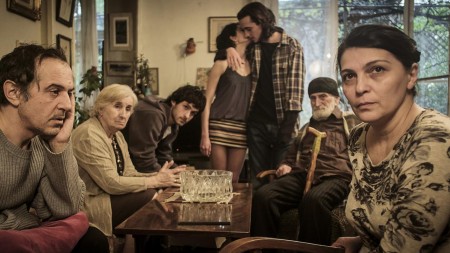
MERAB NINIDZE, BERTA KHAPAVA (LEFT), IA SHUGLIASHVILI (RIGHT) IN MY HAPPY FAMILY
Going non-traditional
One can understand why there are two directors of Ekvtimishvili and Gross's My Happy Fmily. There's a lot of complicated people-wrangling going on here. First of all in the family of Manana, a middle-aged schoolteacher (singer and stage actress Ia Shugliashvili), who do a lot of vociferous squabbling in the crowded, noisy Tbilisi flat all seven of them inhabit. It's fun to watch - until maybe it isn't any more. This is rather like a play, at first anyway. It also "opens up," and most impressive perhaps is Manana's encounter with an old school friend in a local market, the way people keep pushing through them and by them and crowding around them. It's a fine bit of choreography. If New Directors/New Films had an Ensemble Acting prize, My Happy Family would be a prime contender. (This wrangling reminded me of Asghar Farhadi's in The Salesman.)
The second reason why it's good two people directed this film: they're a couple, and this is basically a story about couples - Manana and Soso (Merab Ninidze), their daughter an her husband, and their son and the young pregnant bride he surprises everybody with later on.
Manana and Soso live with her family, which she's sick of (and we can see why). They consist of her querulous and bossy mother (Berta Khapava), her brother, her grandfather, her husband, son Lasha (Giorgi Tabidze) and daughter Nino (Tsisia Qumsashvili) and daughter's husband, augmented on occasion by aunts, uncles and other relatives, as needed. The big squabbles concern Manana's decision to move into a cheap apartment on her own, leaving her husband and all the rest, but the squabbles themselves show us why Manana would want to take this liberating step. It's not that she can't get along with her husband. She can't breathe.
Her departure is against the wishes of everyone over 25. But it's a foregone conclusion we're aware of from the first scene, when she views a sunny if shabby flat in an unfashionable but quiet neighborhood. The price is right, and the decision is made. The objections confirm its validity. But will Manana stay with this decision? Will the tomatoes she plants on the balcony bear fruit? Stay tuned - though the film ends with a question mark, as it should. The conflicts here depicted between traditional and nuclear families, couples and independence, aren't easily resolved.
This is Georgia, where the language has a special lilt, and where any festive gathering means people will sing, in a rich, resonant chorus. The most interesting chapter comes when Manana meets that old friend in the market, who's got her own farm and sells cheese. She tells about a reunion of their school, 35 years out. At this reunion Manana gets some surprise news that deeply upsets her. Though she's in a state, she's prevailed upon to sing for everyone. It's beautiful, and it relates so well to the news she's just gotten this begins to seem a little like a musical. The long takes with ensemble squabbling, the ensemble singing, the surprises, the boisterous well-wrangled small crowds: these are the charms of My Happy Family. The new apartment is nicely conveyed, with sunlight, open doors onto the balcony, Manana sitting quietly (or cleaning up the mess) and listening to Mozart. Scenes of Manana at school are few, but help flesh things out: one session with a girl who's missed classes, and turns out to have left her young husband, is an obvious parallel and link to Manana's departure. All these are aspects of this film's good staging and construction.
Its defects? None really, except that the ending is a little underwhelming (as Jordan Minzer said in his Hollywood Reporter review), and that it is a little too long. After a while it feels like this is, or ought to have been, a miniseries; or, that to be a well made film it needed better editing. It is best in its individual scenes, but some of the less necessary ones could have been shortened or cut out.
My Happy Family/Chemi bednieri ojakhi, 120 mins., debuted at Sundance Jan. 2017, then played at the Berlinale. It was screened for this review as part of the Film Society of Lincoln Center-Museum of Modern Art series, New Directors/New Films 1 Mar. 2017. Released 10 May 2017 in France as Une famille heureuse to excellent reviews - AlloCiné critic rating 3.6. English language reviews are raves - Metacritic rating 86%.
Last edited by Chris Knipp; 08-30-2017 at 06:24 PM.
 Posting Permissions
Posting Permissions
- You may not post new threads
- You may not post replies
- You may not post attachments
- You may not edit your posts
-
Forum Rules





 Reply With Quote
Reply With Quote







Bookmarks